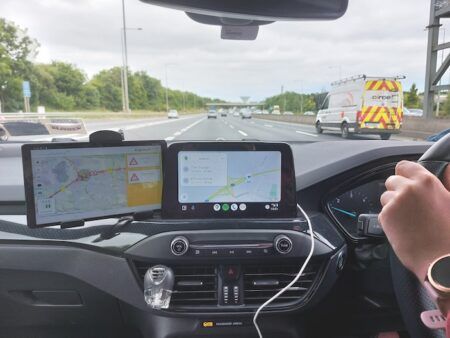Swedish truck manufacturer Scania has become the first company to test new 5G technology components from the country’s telecommunication giant, Ericsson, as part of a collaboration between the two companies exploring the use of 5G networks in transport communications.
The 5G technology will feature prominently in trials of autonomous driving and connected vehicles, with three state-of-the-art mobile base stations installed at Scania’s Södertälje R&D facility, and the test network will be continuously updated with new technology as it is being developed. The 5G network will support many more instances of use than 4G networks, particularly in communication between machines.
For Scania, the low latency (delay) in 5G connections means that the technology could be used by vehicles transmitting braking or directional information to each other, where speed and reliability are vital. It could also be used to help improve the reliability and speed of the exchange of the information between the two or more vehicles in a truck platoon, which the company has recently been trialling in several European and in-house projects. Where previously WLAN technology has been used, the 5G technology, with its guaranteed level of latency and bandwidth, could offer an alternative.
The new technology can also play a key role in tests of Scania’s autonomous vehicle system, such as self-driving vehicles continuously updating a map for autonomous driving, stored on a central server, for distribution to other vehicles in the system. Looking ahead, the trials will not just be limited to the Södertälje testing facility. Scania will also have access to the 5G connection at Ericsson’s head office in Kista, Stockholm, where the company’s 5G test network was previously used to trial smaller, self-driving buses at the end of April, during Drive Sweden’s ‘Kista Mobility Week’. The Kista site will also be the venue for future demonstrations of autonomous vehicles for Scania’s city automation project.
Scania and Ericsson feel that the 5G trials will prove to be of great value. Anders Ställberg, Scania’s project manager for city automation, explained, “The new test network with its 5G components enables a high-quality mobile network service, with low latency and high bandwidth, where a lot of complex data can be transferred very quickly and very reliably, providing us with a ‘priority communications lane’ for projects such as autonomous driving and platooning. It enables us to further develop the capabilities underpinning our ongoing projects, while Ericsson fulfills its desire to test its new technology in a practical working environment.”
Torbjörn Lundahl, program director for the 5G national research program at Ericsson Research, noted, “We want to show other companies how 5G can enable and support the digital transformation of their industry. We hope to gain valuable insights and innovations that will pave the way for further digitalization, using 5G as an enabler. The trials with Scania will help us to understand the requirements to ensure they are met by the 5G standard and products, and deepen our experience with the transportation sector, which is a focus industry for us.”




